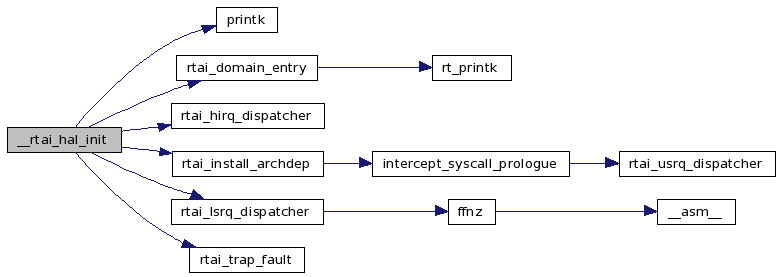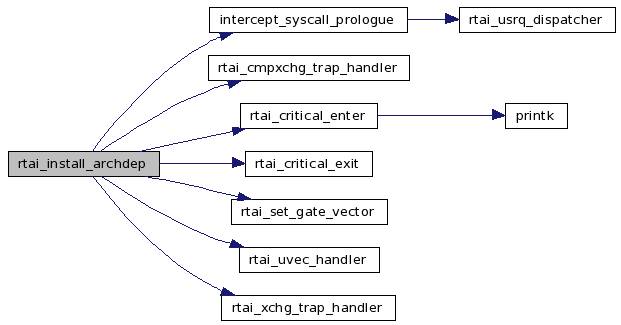|
Files |
| file | hal.c |
| | ARTI -- RTAI-compatible Adeos-based Real-Time Interface.
|
| file | hal.c |
| | ARTI -- RTAI-compatible Adeos-based Real-Time Interface.
|
| file | hal.c |
| | ARTI -- RTAI-compatible Adeos-based Real-Time Interface.
|
| file | hal.c |
| | ARTI -- RTAI-compatible Adeos-based Real-Time Interface.
|
| file | rtai_hal.h |
| | ARTI -- RTAI-compatible Adeos-based Real-Time Interface.
|
| file | rtai_hal.h |
| | ARTI -- RTAI-compatible Adeos-based Real-Time Interface.
|
| file | rtai_hal.h |
| | ARTI -- RTAI-compatible Adeos-based Real-Time Interface.
|
| file | rtai_hal.h |
| | ARTI -- RTAI-compatible Adeos-based Real-Time Interface.
|
| file | rtai_hal.h |
| | ARTI -- RTAI-compatible Adeos-based Real-Time Interface.
|
Defines |
| #define | INCLUDED_BY_HAL_C |
| #define | INCLUDED_BY_HAL_C |
| #define | CHECK_STACK_IN_IRQ 0 |
| #define | __RTAI_HAL__ |
| #define | RTAI_NR_IRQS IPIPE_NR_XIRQS |
| #define | rtai_setup_periodic_apic(count, vector) |
| #define | rtai_setup_oneshot_apic(count, vector) |
| #define | __ack_APIC_irq() |
| #define | rtai_irq_desc(irq) (irq_desc[irq].chip) |
| #define | BEGIN_PIC() |
| #define | END_PIC() |
| #define | hal_lock_irq(x, y, z) |
| #define | hal_unlock_irq(x, y) |
| #define | REQUEST_LINUX_IRQ_BROADCAST_TO_APIC_TIMERS() 0 |
| #define | FREE_LINUX_IRQ_BROADCAST_TO_APIC_TIMERS() ; |
| #define | RTAI_SCHED_ISR_LOCK() |
| #define | RTAI_SCHED_ISR_UNLOCK() |
| #define | HAL_TICK_REGS hal_tick_regs[cpuid] |
| #define | HAL_LOCK_LINUX() do { sflags = rt_save_switch_to_real_time(cpuid); } while (0) |
| #define | HAL_UNLOCK_LINUX() do { rtai_cli(); rt_restore_switch_to_linux(sflags, cpuid); } while (0) |
| #define | __STR(x) #x |
| #define | STR(x) __STR(x) |
| #define | SYMBOL_NAME_STR(X) #X |
| #define | SAVE_REG |
| #define | RSTR_REG |
| #define | DEFINE_VECTORED_ISR(name, fun) |
| #define | rtai_critical_sync NULL |
| #define | CHECK_KERCTX() ; |
| #define | HINT_DIAG_MSG(x) |
| #define | INCLUDED_BY_HAL_C |
| #define | RTAI_SYSCALL_MODE |
| #define | RTAI_DUOSS |
| #define | LOCKED_LINUX_IN_IRQ_HANDLER |
| #define | DOMAIN_TO_STALL (fusion_domain) |
| #define | RTAI_NR_CPUS 1 |
| #define | do_div(n, base) |
| #define | RTAI_DEFAULT_TICK 100000 |
| #define | RTAI_DEFAULT_STACKSZ 1024 |
| #define | RTAI_SYSCALL_MODE |
| #define | RTAI_DUOSS |
| #define | LOCKED_LINUX_IN_IRQ_HANDLER |
| #define | DOMAIN_TO_STALL (fusion_domain) |
| #define | RTAI_NR_CPUS 1 |
| #define | do_div(n, base) |
| #define | RTAI_DEFAULT_TICK 100000 |
| #define | RTAI_DEFAULT_STACKSZ 1024 |
| #define | RTAI_SYSCALL_MODE |
| #define | RTAI_DUOSS |
| #define | LOCKED_LINUX_IN_IRQ_HANDLER |
| #define | DOMAIN_TO_STALL (fusion_domain) |
| #define | RTAI_NR_CPUS 1 |
| #define | FIRST_EXTERNAL_VECTOR 0x40 |
| #define | RTAI_DEFAULT_TICK 100000 |
| #define | RTAI_DEFAULT_STACKSZ 1024 |
| #define | RTAI_SYSCALL_MODE |
| #define | LOCKED_LINUX_IN_IRQ_HANDLER |
| #define | UNWRAPPED_CATCH_EVENT |
| #define | RTAI_NR_CPUS 1 |
| #define | RTAI_DEFAULT_TICK 100000 |
| #define | RTAI_DEFAULT_STACKSZ 1024 |
Functions |
| | MODULE_LICENSE ("GPL") |
| | RTAI_MODULE_PARM (rtai_cpufreq_arg, ulong) |
| unsigned long | rtai_critical_enter (void(*synch)(void)) |
| void | rtai_critical_exit (unsigned long flags) |
| | RTAI_MODULE_PARM (IsolCpusMask, ulong) |
| int | rt_request_irq (unsigned irq, int(*handler)(unsigned irq, void *cookie), void *cookie, int retmode) |
| int | rt_release_irq (unsigned irq) |
| int | rt_ack_tmr (unsigned int irq) |
| int | rt_ack_uart (unsigned int irq) |
| int | rt_set_irq_ack (unsigned irq, int(*irq_ack)(unsigned int)) |
| void | rt_set_irq_cookie (unsigned irq, void *cookie) |
| void | rt_set_irq_retmode (unsigned irq, int retmode) |
| unsigned | rt_startup_irq (unsigned irq) |
| | start and initialize the PIC to accept interrupt request irq.
|
| void | rt_shutdown_irq (unsigned irq) |
| | Shut down an IRQ source.
|
| static void | _rt_enable_irq (unsigned irq) |
| void | rt_enable_irq (unsigned irq) |
| | Enable an IRQ source.
|
| void | rt_disable_irq (unsigned irq) |
| | Disable an IRQ source.
|
| void | rt_mask_and_ack_irq (unsigned irq) |
| | Mask and acknowledge and IRQ source.
|
| static void | _rt_end_irq (unsigned irq) |
| void | rt_unmask_irq (unsigned irq) |
| | Unmask and IRQ source.
|
| void | rt_ack_irq (unsigned irq) |
| | Acknowledge an IRQ source.
|
| void | rt_end_irq (unsigned irq) |
| void | rt_eoi_irq (unsigned irq) |
| int | rt_request_linux_irq (unsigned irq, void *handler, char *name, void *dev_id) |
| | Install shared Linux interrupt handler.
|
| int | rt_free_linux_irq (unsigned irq, void *dev_id) |
| | Uninstall shared Linux interrupt handler.
|
| void | rt_pend_linux_irq (unsigned irq) |
| | Pend an IRQ to Linux.
|
| RTAI_SYSCALL_MODE void | usr_rt_pend_linux_irq (unsigned irq) |
| int | rt_request_srq (unsigned label, void(*k_handler)(void), long long(*u_handler)(unsigned long)) |
| | Install a system request handler.
|
| int | rt_free_srq (unsigned srq) |
| | Uninstall a system request handler.
|
| void | rt_pend_linux_srq (unsigned srq) |
| | Append a Linux IRQ.
|
| irqreturn_t | rtai_broadcast_to_local_timers (int irq, void *dev_id, struct pt_regs *regs) |
| int | rt_assign_irq_to_cpu (int irq, unsigned long cpus_mask) |
| int | rt_reset_irq_to_sym_mode (int irq) |
| void | mcf_settimericr (int timer, int level) |
| int | rt_request_timer (void(*handler)(void), unsigned tick, int unused) |
| | Install a timer interrupt handler.
|
| void | rt_free_timer (void) |
| | Uninstall a timer interrupt handler.
|
| long long | rdtsc () |
| RT_TRAP_HANDLER | rt_set_trap_handler (RT_TRAP_HANDLER handler) |
| int | rtai_8254_timer_handler (struct pt_regs regs) |
| static int | rtai_hirq_dispatcher (unsigned irq, struct pt_regs *regs) |
| | RTAI_MODULE_PARM (PrintFpuTrap, int) |
| | RTAI_MODULE_PARM (PrintFpuInit, int) |
| static int | rtai_trap_fault (unsigned event, void *evdata) |
| static void | rtai_lsrq_dispatcher (unsigned virq) |
| static long long | rtai_usrq_dispatcher (unsigned long srq, unsigned long label) |
| static int | intercept_syscall_prologue (unsigned long event, struct pt_regs *regs) |
| int | usi_SRQ_call (unsigned long srq, unsigned long args, long long *result, unsigned long lsr) |
| asmlinkage int | rtai_syscall_dispatcher (__volatile struct pt_regs pt) |
| void | rtai_uvec_handler (void) |
| | DEFINE_VECTORED_ISR (rtai_uvec_handler, rtai_syscall_dispatcher) |
| desc_struct | rtai_set_gate_vector (unsigned vector, int type, int dpl, void *handler) |
| void | rtai_cmpxchg_trap_handler (void) |
| | __asm__ ("rtai_cmpxchg_trap_handler:\n\t""move #0x2700,%sr\n\t""movel %a1@, %d0\n\t""cmpl %d0,%d2\n\t""bnes 1f\n\t""movel %d3,%a1@\n\t""1:\n\t""rte") |
| void | rtai_xchg_trap_handler (void) |
| | __asm__ ("rtai_xchg_trap_handler:\n\t""move #0x2700,%sr\n\t""movel %a1@, %d0\n\t""movel %d2,%a1@\n\t""rte") |
| void | rtai_reset_gate_vector (unsigned vector, struct desc_struct e) |
| static void | rtai_install_archdep (void) |
| static void | rtai_uninstall_archdep (void) |
| int | rtai_calibrate_8254 (void) |
| void(*)(int) | rt_set_ihook (void(*hookfn)(int)) |
| void | rtai_set_linux_task_priority (struct task_struct *task, int policy, int prio) |
| void | ack_bad_irq (unsigned int irq) |
| int | __rtai_hal_init (void) |
| void | __rtai_hal_exit (void) |
| | module_init (__rtai_hal_init) |
| | module_exit (__rtai_hal_exit) |
| asmlinkage int | rt_printk (const char *fmt,...) |
| asmlinkage int | rt_sync_printk (const char *fmt,...) |
| void * | ll2a (long long ll, char *s) |
| | EXPORT_SYMBOL (rtai_realtime_irq) |
| | EXPORT_SYMBOL (rt_request_irq) |
| | EXPORT_SYMBOL (rt_release_irq) |
| | EXPORT_SYMBOL (rt_set_irq_cookie) |
| | EXPORT_SYMBOL (rt_set_irq_retmode) |
| | EXPORT_SYMBOL (rt_startup_irq) |
| | EXPORT_SYMBOL (rt_shutdown_irq) |
| | EXPORT_SYMBOL (rt_enable_irq) |
| | EXPORT_SYMBOL (rt_disable_irq) |
| | EXPORT_SYMBOL (rt_mask_and_ack_irq) |
| | EXPORT_SYMBOL (rt_unmask_irq) |
| | EXPORT_SYMBOL (rt_ack_irq) |
| | EXPORT_SYMBOL (rt_end_irq) |
| | EXPORT_SYMBOL (rt_eoi_irq) |
| | EXPORT_SYMBOL (rt_request_linux_irq) |
| | EXPORT_SYMBOL (rt_free_linux_irq) |
| | EXPORT_SYMBOL (rt_pend_linux_irq) |
| | EXPORT_SYMBOL (usr_rt_pend_linux_irq) |
| | EXPORT_SYMBOL (rt_request_srq) |
| | EXPORT_SYMBOL (rt_free_srq) |
| | EXPORT_SYMBOL (rt_pend_linux_srq) |
| | EXPORT_SYMBOL (rt_assign_irq_to_cpu) |
| | EXPORT_SYMBOL (rt_reset_irq_to_sym_mode) |
| | EXPORT_SYMBOL (rt_request_timer) |
| | EXPORT_SYMBOL (rt_free_timer) |
| | EXPORT_SYMBOL (rdtsc) |
| | EXPORT_SYMBOL (rt_set_trap_handler) |
| | EXPORT_SYMBOL (rt_set_ihook) |
| | EXPORT_SYMBOL (rt_set_irq_ack) |
| | EXPORT_SYMBOL (rtai_calibrate_8254) |
| | EXPORT_SYMBOL (rtai_broadcast_to_local_timers) |
| | EXPORT_SYMBOL (rtai_critical_enter) |
| | EXPORT_SYMBOL (rtai_critical_exit) |
| | EXPORT_SYMBOL (rtai_set_linux_task_priority) |
| | EXPORT_SYMBOL (rtai_linux_context) |
| | EXPORT_SYMBOL (rtai_domain) |
| | EXPORT_SYMBOL (rtai_proc_root) |
| | EXPORT_SYMBOL (rtai_tunables) |
| | EXPORT_SYMBOL (rtai_cpu_lock) |
| | EXPORT_SYMBOL (rtai_cpu_realtime) |
| | EXPORT_SYMBOL (rt_times) |
| | EXPORT_SYMBOL (rt_smp_times) |
| | EXPORT_SYMBOL (rt_printk) |
| | EXPORT_SYMBOL (rt_sync_printk) |
| | EXPORT_SYMBOL (ll2a) |
| | EXPORT_SYMBOL (rtai_set_gate_vector) |
| | EXPORT_SYMBOL (rtai_reset_gate_vector) |
| | EXPORT_SYMBOL (rtai_catch_event) |
| | EXPORT_SYMBOL (rtai_lxrt_dispatcher) |
| | EXPORT_SYMBOL (rt_scheduling) |
static __inline__ unsigned
long | ffnz (unsigned long word) |
| static unsigned long long | rtai_ulldiv (unsigned long long ull, unsigned long uld, unsigned long *r) |
| static int | rtai_imuldiv (int i, int mult, int div) |
| static long long | rtai_llimd (long long ll, int mult, int div) |
| static unsigned long long | rtai_u64div32c (unsigned long long a, unsigned long b, int *r) |
| static unsigned long long | rtai_llimd (unsigned long long ll, unsigned int mult, unsigned int div) |
| static long | rtai_imuldiv (long i, long mult, long div) |
| static long long | rtai_llimd (long long ll, long mult, long div) |
Variables |
| static unsigned long | rtai_cpufreq_arg = CONFIG_CLOCK_FREQ |
| struct { |
| volatile int locked |
| volatile int rqsted |
| } | rt_scheduling [RTAI_NR_CPUS] |
| static void(*) | rtai_isr_hook (int cpuid) |
| hal_domain_struct | rtai_domain |
| rtai_realtime_irq_s | rtai_realtime_irq [RTAI_NR_IRQS] |
| struct { |
| unsigned long flags |
| int count |
| } | rtai_linux_irq [RTAI_NR_IRQS] |
| struct { |
| void(* k_handler )(void) |
| long long(* u_handler )(unsigned long) |
| unsigned long label |
| } | rtai_sysreq_table [RTAI_NR_SRQS] |
| static unsigned | rtai_sysreq_virq |
| static unsigned long | rtai_sysreq_map = 1 |
| static unsigned long | rtai_sysreq_pending |
| static unsigned long | rtai_sysreq_running |
| static spinlock_t | rtai_lsrq_lock = SPIN_LOCK_UNLOCKED |
| static volatile int | rtai_sync_level |
| static atomic_t | rtai_sync_count = ATOMIC_INIT(1) |
| static struct desc_struct | rtai_sysvec |
| static struct desc_struct | rtai_cmpxchg_trap_vec |
| static struct desc_struct | rtai_xchg_trap_vec |
| static RT_TRAP_HANDLER | rtai_trap_handler |
| rt_times | rt_times |
| rt_times | rt_smp_times [RTAI_NR_CPUS] |
| rtai_switch_data | rtai_linux_context [RTAI_NR_CPUS] |
| calibration_data | rtai_tunables |
| volatile unsigned long | rtai_cpu_realtime |
| volatile unsigned long | rtai_cpu_lock [2] |
| unsigned long | IsolCpusMask = 0 |
| static int | timer_inuse = 0 |
| unsigned long | io_apic_irqs |
| static int | PrintFpuTrap = 0 |
| static int | PrintFpuInit = 0 |
| long long(*) | rtai_lxrt_dispatcher (unsigned long, unsigned long) |
| static int(*) | sched_intercept_syscall_prologue (struct pt_regs *) |
| void * | _ramvec |
| void * | hal_irq_handler |
























 1.4.7
1.4.7